
Chiyoda Sakura Festival 2026
Kim BergströmThe Chiyoda Sakura Festival takes place around Chidorigafuchi moat, which is one of Tokyo's most picturesque places for cherry blossom viewing.

The Chidorigafuchi Trench is one of the best places in Tokyo to see the cherry blossoms in spring, from late March to early April. This 700-meter walk next to the Imperial Palace moat offers beautiful scenery and great opportunities for discovery.
During the popular cherry blossom season, the paths along the moat are colored pink by hundreds of cherry trees. The trees are also lit at night during the Chiyoda Sakura Cherry Blossom Festival. A little later in the year the surface of the water is almost completely covered by falling petals. Many couples rent boats and take a romantic excursion through this pink wonderland.
Nearby attractions include Yasukuni Shrine, Showa National Memorial Museum, Nippon Budokan, and the Jimbocho Bookseller District.
Hailed as one of the most beautiful places to see cherry blossoms in Tokyo, Chidorigafuchi receives over one million visitors every year for the spring season. Head to the 700 meter long Chidorigafuchi Green Way walking path to discover a tunnel of cherry blossom. Seating along the bank of the moat is extremely limited so arrive extra early if you’re wanting to sit and admire the flowers all day. For a more surreal vista of the flowers admire their beauty at night when the trees are illuminated from sunset to 10 pm.
Boat rentals are available from March to November every year and offer a great way to see the moat, or cherry blossoms if the season is right. It only costs 500 yen for 30 minutes during the offseason and 800 yen for 30 minutes during the cherry blossom season. Wonder in awe as your row through the moat decorated with a blanket of soft pink petals.
Chidorigafuchi Cemetery interred some 350,000 war casualty civilians and soldiers from World War II from air raids and the atomic bombings of Hiroshima and Nagasaki. The monument built in the remembrance of the ugliness of war is a simple and somber one, but impressive nonetheless. The cemetery is accessible between the moat and Yasukuni Shrine.
Chidorigafuchi is directly adjacent to Exit 2 at Kudanshita Station.

The Chiyoda Sakura Festival takes place around Chidorigafuchi moat, which is one of Tokyo's most picturesque places for cherry blossom viewing.

Chidorigafuchi Walkway is one of the most popular spots for cherry blossom viewing in Japan. This 770m walkway is lined with 260 cherry trees.
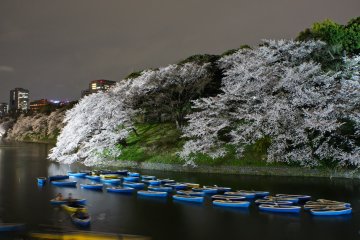
During my first visit to Tokyo I was lucky to arrive in March and stay right through April, the cherry blossom season. I visited the Indian embassy in Kudanshita, and that was when I saw the blossoms in its full glory at the Chidorigafuchi Gardens just outside the premises.
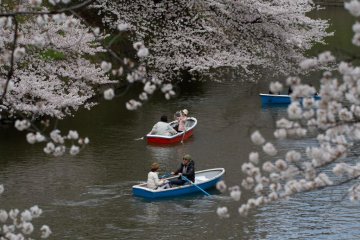
Chidorigafuchi, the moat around the Imperial Palace in Tokyo is surely one of the prime spots for hanami (cherry blossom viewing) in the city and always worth a visit.

Located near the Imperial Palace and the Yasukuni Shrine, Chidorigafuchi Is a national Japanese cemetery and memorial for around 350,000 unidentified war dead of the Second World War.

There are a myriad of great summer festivals to enjoy in Tokyo, and one of the prettiest has to be the Chidorigafuchi Moat Lantern Festival. With a history dating back to 1958, the event sees around 2000 gentle lantern lights decorate the water's surface.

The Chiyoda Sakura Festival takes place around Chidorigafuchi moat, which is one of Tokyo's most picturesque places for cherry blossom viewing.

Why not enjoy a nice relaxing boat ride around the Chidorigafuchi Moat during this year's Chiyoda Sakura Festival? There are many activities for tourists and locals to enjoy during this festival, such as a “riddle-solving game” that will take you around Chiyoda City, but the boat cruise is the highlight. The Chiyoda Sakura Festival will be ongoing from March 2 through April 24, 2023. [photo id='234335'] This activity is available during the day or at night as the city illuminates the greenway for everyone to see. Sakura, or cherry blossom, season in Japan is one of the most beautiful times of the year, and while it's enjoyable to see the trees in parks or along the street, why not try something new and admire them from the water? There are two options for exploring the moat: a rowboat and a pedal boat in the shape of a cute swan. Life jackets are provided for those that wish to have them. [photo id='234336'] Being on the water presents unique photo opportunities, especially considering you are in charge of the boat's location along the moat. The area can be crowded, so please understand that you will need to know how to row effectively. Keep the above information in mind when purchasing tickets to give yourself the best experience possible. There will be a lot to see and do as this is the first time in four years that the city is holding the festival due to COVID-19. Tickets for the boat cruise will cost 800 yen for 30 minutes and 1,600 yen for an hour per boat. [photo id='234337']
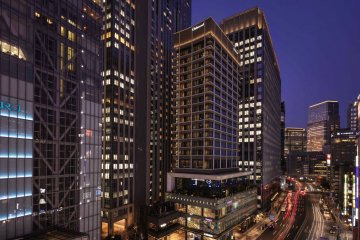
Oakwood Premier Tokyo comes from a brand of standout luxury hotel & service apartments right at the heart of the Tokyo metropolis. It is located in the business hub of Marunouchi with JR Tokyo Station in close proximity. This will allow guests and travelers to easily access the city's extensive transport network and visit various landmarks such as Imperial Palace, Tsukiji Fish Market, Ginza and Shopping District. Boasting 123 luxurious apartments on the upper floors of a multi-serviced complex, each room offers a magnificent view of the city, not to mention all furnished and a fully-equipped kitchen set which is rarely seen in your everyday service apartment. Without doubt, these spacious tranquil retreats are curated to give you the amenities and services of a luxury hotel and a feeling of home. They are good options for both business executives and leisure travelers from one night of a short-stay to a few weeks/months of mid-to-long-term stay.

NOHGA HOTEL AKIHABARA TOKYO is conveniently located in the midst of the electric town Akihabara, also known as the capital of manga and anime. In addition, this neighborhood has an abundance of tech shops, maid cafes and a variety of restaurants. With just a 6-minute walk away from Akihabara station, it provides easy access to explore other areas nearby such as Ueno and Asakusa. This hotel embodies the rich cultures of music, art and food. Nohga’s concept of music is derived from Akihabara’s local history, starting as a district of radio and wireless component merchants in the late 1920s. The artistic and luxurious space throughout the hotel is achieved by featuring art and amenities designed in collaboration with craftsmen from around Japan. As for the food menu, it’s seasonal fresh ingredients are sourced domestically. The glasses and dinnerware served are collaborations with stores in the surrounding area. All 120 non-smoking guest rooms feature an ensuite bathroom with a rain shower, in-room safety box, mini fridge, USB plugs, free Wi-Fi, a high-quality bluetooth speaker and flatscreen TV with original music and film. The lounge area and a compact 24-hour gym can be found near the reception on the second floor. Services include laundry (from 2,750JPY) and a 24-hour front desk with a check-in time of 3PM and check-out time of 11AM. For sightseeing you can rent a Tokyobike for the day (2,000 JPY/day) to explore the vicinity.
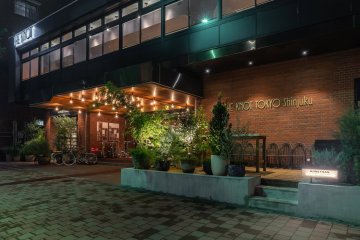
Located right next to Shinjuku Chuo Park, THE KNOT TOKYO Shinjuku is a modern hotel with an exceptional design and easy access to the nearby Shinjuku train station and the Meiji Shrine. The 14-story hotel building was renovated and reopened in August 2018 as THE KNOT TOKYO Shinjuku . The western-style rooms offer a park view on the top floor as well as a newly opened terrace suite. The spacious atrium design offers a relaxed atmosphere and connects the restaurant, bar, lounge and lobby with one another. One of the highlights of THE KNOT is the delicious dishes. There are six areas in which food and drinks are offered. From the grill area to high-quality black tea and fresh bread, everything is on offer.

PIZZERIA & BAR NOHGA is an all day dining restaurant interpreting a fusion of “Spanish Italian” cuisine and has a kitchen to table design. There is a casual bar area and restaurant where you can take a peek inside the open kitchen whilst enjoying your meal. Visit the cafe for a range of coffees and teas along with an offering of tapas snacks and seasonal desserts. The cafe also offers an assorted dessert and all-you-can-drink cafe set. Breakfast takes on the art of sharing, where a range of platters are combined with focaccia and your choice of eggs cooked your way. Coming for lunch? Choose from a selection of pizzas, pastas and salads. Each lunch menu is accompanied with homemade soup, iced tea and focaccia. Dinner time offers a range of exquisite tapas and pizzas that can also be shared. Breakfast: 07:00 - 10:00, Lunch 11:30 - 14:30, Cafe 14:30 - 18:00, Dinner: 18:00 - 23:00 with last order at 10pm.
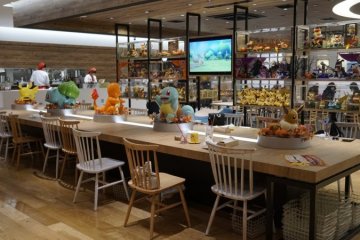
The Pokémon Café in Nihonbashi, which opened in March 2018, is the latest character café in the popular series of games and series in Tokyo. The café and the adjacent Pokémon Center DX store were opened in 1997 on the occasion of the 20th anniversary of the first store. The bright café, which is furnished in warm wood tones, offers main courses, desserts and drinks - all of which are arranged with a focus on one or more Pokémon and some are suitable and limited to certain topics or seasons. You can also find exclusive merchandise here - from plush toys in chef jackets to bowls and cutlery with Pokémon motifs. They also sell Pikachu Sweets, special sweets and products with the most popular of all Pokémon as a motif. A visit to the Pokémon Café is only possible with a prior reservation, time slots can be selected from one month in advance and also in English via the website. It is located on the 5th floor of the Nihombashi Takashimaya Shopping Center, which is not far from the Tokyo and Nihonbashi stations.

Bunny Cafe Moff Rell in Tokyo's Chiyoda Ward offers a chance to interact with adorable rabbits. You can make reservations for the cafe by phone, or you can visit and pay at the store before entering. The cafe provides 30- and 60-minute courses, and you can play with or feed the bunnies. If you are unsure about how to treat the rabbits, don't worry! The staff members will kindly explain everything to you. Minimum age is 10 years old.

The Nippon Budokan, located in Chiyoda, Tokyo, is one of Japan’s most iconic cultural and sporting venues. Originally built for the judo competition in the 1964 Tokyo Olympics, the Budokan has evolved into a revered hall for both martial arts and music performances. Its name, meaning "Martial Arts Hall of Japan," reflects its traditional purpose. Designed with a distinct octagonal roof inspired by Yumedono at Horyu-ji Temple, the building represents a blend of modern construction and traditional Japanese aesthetics. While still regularly hosting national martial arts tournaments such as kendo, aikido, and karate, the Budokan is perhaps equally famous among international visitors for its storied history as a concert venue. In 1966, The Beatles became the first rock band to perform there, sparking controversy at the time due to the venue’s sacred association with martial arts. Since then, legendary artists like Bob Dylan, Queen, and Japanese icons such as X Japan and Hikaru Utada have performed here, making it a pilgrimage site for music lovers. The Budokan is located within Kitanomaru Park, part of the former Edo Castle grounds, which adds natural beauty and historical depth to any visit. The surrounding area, including the Imperial Palace and Chidorigafuchi Moat, is also known for its scenic cherry blossoms in spring. Whether you're attending a martial arts event, a concert, or simply enjoying the park and its historical foundation, the Nippon Budokan offers a unique blend of culture, history, and entertainment.

The National Museum of Modern Art, Tokyo, (abbreviated as MOMAT) is Japan’s first national art museum. The museum was initially founded in 1952 in Chuo Ward, before it was relocated in 1969 to its larger present-day location in Chiyoda Ward beside the Imperial Palace. The sleek facility was designed by architect Yoshio Taniguchi and has undergone multiple renovations and expansions to meet its ever-growing collection. The main building itself extends 4,500 square meters, making it one of Japan’s largest art museums. Aside from the main building, MOMAT also includes the Crafts Gallery, which opened in 1977. This gallery is located in the former Imperial Guards headquarters and is a beautiful example of western-style brick architecture from the Meiji period. The museum has an impressive collection of about 13,000 Japanese- and Western-style pieces from the early 20th century to present day and displays about 200 works at a time. The main hall generally features paintings, prints, watercolors, drawings, sculptures, and photographs, while the Crafts Gallery displays ceramics, glasswork, lacquerware, woodwork, bamboo work, graphic design, and more. MOMAT also includes a museum shop and a French-and-Italian-fusion restaurant.

Yasukuni Shrine (Yasukuni Jinja), located in Chiyoda City, Tokyo, was established in 1869 by Emperor Meiji to commemorate and honor those who gave their lives for their country during war time. Today, the shrine is dedicated to nearly 2.5 million souls from a number of conflicts, including the Boshin War, the Seinan War, World War I, the Manchurian Incident, the China Incident, and World War II. Men, women, and children who supported Japan in roles such as, but not limited to, soldiers, factory workers, and civil service workers are worshipped equally regardless of rank, social status, or gender. The shrine solemnly recognizes the names, origins, birth dates, and places of death of these individuals by listing their information on-site. The shrine stands as a solemn reminder of the effects of war with an atmosphere of both respect and tragedy. Though in recent years, Yasukuni has become one of Japan’s most controversial shrines. History of Yasukuni Shrine Emperor Meiji founded Yasukuni Jinja in 1869 during the second year of the Meiji Restoration. During this time, Japan was going through political reform, which sparked an internal conflict known as the Boshin War, where people in favor of military rule fought individuals who aimed to return power to the Imperial court. After this significant event, Emperor Meiji ordered the construction of Shokonsha Shrine, which he later renamed Yasukuni Jinja in 1879, to honor those who gave their lives for this historic change. Emperor Meiji founded Yasukuni to stand as a symbol of the ultimate sacrifices people made to bring peace to Japan. Today, the shrine is recognized as an Imperial Shrine of Special Status. Controversy In recent years, Yasukuni Jinja has seen some political controversy as fourteen convicted class A war criminals from WWII are enshrined among the deified souls. This has put many of Japan's leading ministers under scrutiny for visiting the shrine, related to the principle of separation of church and state. Today Five million people visit Yasukuni Jinja every year to pay their respects to the enshrined souls. The shrine is free to visit and is open year-round from 6:00 to 18:00 (17:00 from November to February). Yasukuni’s entrance is marked by the dominating Daiichi Torii, which is the first shrine gate and one of the tallest torii’s in Japan, standing at 22 meters tall. As visitors pass the threshold onto the sacred grounds, they are enveloped in an atmosphere of solemn serenity. The traditional, yet not overly-flamboyant architecture coupled with the surrounding nature creates a peaceful environment that honors the enshrined souls. Directly past the torii is a bronze statue of Omura Masujiro, the first Minister of War after the Meiji Restoration. Continuing forward, guests will pass through a second torii, named Daini and then Shinmon, a pagoda-style main gate. The main area of the shrine opens up to a courtyard filled with cherry blossoms, which leads to Haiden Main Hall and Yushukan Museum to the right. Yushukan Museum is an impactful building that tells the stories of the countless enshrined souls. Though the museum has also come under scrutiny due to its conservative and biased retelling of wartime events. The museum has an 800 JPY admission fee and is open from 9:00 to 16:30. For springtime enthusiasts, Yasukuni is also a significant spot as it is home to Tokyo’s representative cherry blossom tree, which is used by meteorologists to announce the official start of the cherry blossom season. Yasukuni Jinja performs daily rituals where it offers food and words of gratitude to the dead, and twice a year, in spring and autumn, it performs major rituals in which offerings by the emperor are consecrated. Members of the imperial family also take part in these rites. The shrine also plays host to numerous Shinto festivals and rituals year-round.